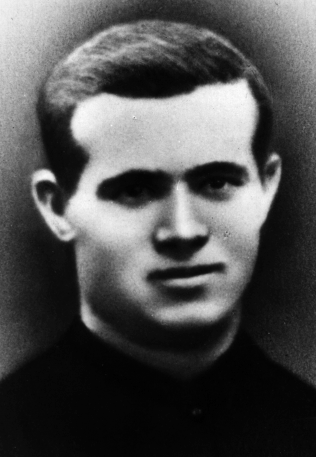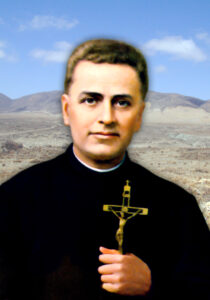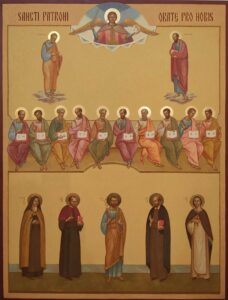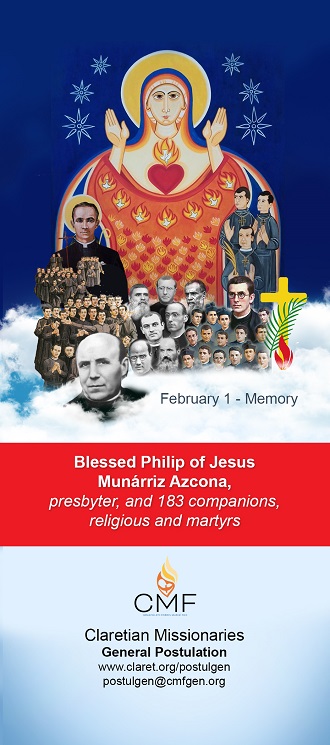Claretian Missionary. 23 years old. Student of Theology. He was born in Almatret, a small village of the Province and Diocese of Lérida, Spain, on August 18, 1913. The early death of his mother meant that José María based his formation on the care of his father and teachers. It is not surprising in José María that he always had a somewhat dour character, although with a sympathetic manner, “frank and open, and a well-developed sense of justice”. His teacher, impressed by the boy’s qualities, suggested that he go to a seminary for religious. – And what would I be?” asked the boy. – Well, perhaps a great sage. The fact is that José María, with the intuition of a child, saw that it was God’s plan, for to the companion who wanted to discourage him, he replied calmly: “I have a vocation, and only God can take it away from me”. And to his father, who visited him in the Seminary and tested him by telling him why he did not leave once he had taken advantage of his studies, he said: “No, that would be misbehaving with the Congregation. Besides, I have a vocation and I want to be true to God’s call”. Thus disposed, she entered the novitiate and was professed in the Congregation of the Missionary Sons of the Heart of Mary on 15 August 1930. On the final day of his studies, he was martyred on 13 August 1936. Before his death, he signed his name with a patriotic and religious “Viva España Católica”. He was beatified by Pope John Paul II on 25 October 1992.
Blessed Fr. Claret the Thinker
Since there are many different prisms that refract the light of reality towards God, according to the perfections under which we consider him, Fr Claret chose his eternity. The thought of eternity was like a magic wand and set in motion all the forces of his heart. Already as a child, when he was four or five years old, when he could not sleep, he would sit on his bed and there, in holy reflection and with his eyes looking at heaven, he would spend the hours thinking of the terrible “always”… “never” of the sufferings of hell; making numerical calculations about eternity and never reaching the end; considering the eternity of God, he had the things of this world in their just value, seeing their passing, their limited reality and little consistency, and the vaporousness of time; absorbed in these contemplations his spirit was burning with the love of the Lord and he was encouraged to pray for the conversion of sinners and the dying.
Later, when he was trying to make his choice of state, moved by the memory of eternity that had been so deeply engraved on him in his childhood, and having given up the flattery that the world offered him, he courageously embraced the priestly vocation, and once he had climbed the steps of the holy altar, he tirelessly travelled through Spain, the Canary Islands, placed himself at the service of Propaganda Fide, went to Cuba, preaching everywhere the “tempus non est amplius”, “there is no more time”, this was the vertex around which the activity of Fr. Claret; this was the motive of his preaching and writings; this was the end to which he directed all his efforts in conquering souls for Jesus Christ.
Another fruit of the thought of eternity was the motto that, like a faithful soldier of Christ, he displayed on his coat of arms, the ardent “charitas Christi urget nos”, the charity of Christ and the zeal for the salvation of souls urges me; seeing the brevity of time and how much has to be done to win the world for Jesus Christ stimulates and urges me in such a way that I feel my breast burning with the desire to travel the whole world and save it with the preaching of the doctrine of Jesus Christ and the brevity of human things.
Fr Claret was certainly not mistaken in considering the things of this world in this way, for how was it possible for it to be so, if he considered everything in relation to God to whom it belongs by essence to be unchangeable, eternal, the centre of our happiness and the supreme reason for all that exists?
May God raise up many men like Claret who preach the eternity of God and the finiteness of what is before our eyes, and make the different classes of the present society come a little more to their senses. Oh! If we were to consider things through the prism of eternity, that is, if we were thinkers, how different the men of the present century would be, and how different the spiritual world of souls would look.
José M. Ormo C.M.F.
Cervera, January 28, 1934.



